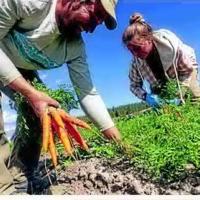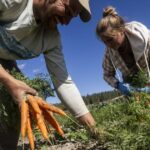MISSOULA — If you’re eating leafy greens in Montana in the winter, there’s a very good chance it was grown in California or Mexico, stuffed in a plastic bag with the logo of a big corporation, loaded onto a truck and shipped to Montana to sit on a grocery store shelf.
That’s unless, of course, you buy food from Winter Kissed Farm in Stevensville, where the dedicated workers bundle up in the cold and use greenhouses to harvest greens and other veggies throughout the long, dark, icy Montana winter when most other agricultural operations are dormant.
With their Community Supported Agriculture (CSA) model, they deliver those cold-hardened vegetables to customers all over western Montana, including Missoula, Helena, Polson, Kalispell, Hamilton and Stevensville.
And recently, the farm received some huge news: They won a $180,000 grant from the federal government to help them expand operations and try to go from 350 current CSA customers to their goal of 500 in three years.
People are also reading…
Max Smith and Katelyn Madden of Winter Kissed Farm spent countless hours working on the grant application with Grace Nichols, the specialty crop business development program manager at the Ravalli County Economic Development Authority.
“What Max and Katie are doing is kind of cutting-edge,” Nichols explained. “A lot of producers across the region are trying to mimic that. There’s much less competition in the winter. People will pay more for fresh, local greens in the winter when they’re not really available.”
As things stand right now, they farm during the summer as well, selling through CSAs and local farmers markets. Smith said growing year-round is extremely hard work.
“The dream has always been to just do winter growing, and I think that this grant is going to move us closer to that reality because we’ll be generating more income and have a large enough crew to grow longer,” Smith said on Wednesday as he yanked carrots out of the ground with his co-workers. “And hopefully we can attract 500 (total) people and move out of the farmers markets entirely.”
The grant comes from the U.S. Department of Agriculture’s “Value-Added Producer Grant” program.
Nichols said that it’s a competitive grant, and Winter Kissed Farm’s produce is considered “value-added” because it’s grown in winter when Montana customers don’t normally have access to Montana-grown vegetables.
“Max and Katie demonstrated how Montana-grown products are worth more than other products sold in the state,” Nichols explained. “For example, winter squash from Mexico or California is valued less than winter squash grown in Montana. They also showed that the CSA is a value-added product. With winter greens, they are able to charge more for this box of products than if it was just storage crops.”
Nichols said the application was over 100 pages and contained a massive amount of information and detail.
“They really know their competitors and price points,” Nichols said of Madden and Smith. “They showed the value of this product, they showed their success as an operation and as an employer and they submitted a really, really, really well-written application.”
The grant will pay for improvements to packaging, a little bit of advertising and it will also help the farm hire more workers for post-harvest labor, among other things.
“I think that western Montana really values local food,” Nichols said. “People really care about food miles (how far away a food was grown) and knowing who their producer is. Also, spinach grown in Montana tastes so much better than food trucked in from Mexico or California.”
Smith and Madden are also contributing $180,000 in matching funds in the form of cash to the grant, because the government wants to fund businesses that have already proven they are successful and sustainable.
The grant will also help them boost their online store, where they sell products like fruit, mushrooms and fermented veggies made by other producers in the Bitterroot Valley.
Madden said that right now they’re producing about 180,000 pounds of veggies, and the grant could help them produce about 220,000 pounds. She said Missoula is a huge chunk of their customer base, but they’re also picking up quite a few customers in Helena and in the Flathead Valley, two locations where they deliver CSAs.
Nichols said she hopes other farmers will reach out to her if they’re interested in grant funding to help them expand.
“If other producers are interested in these big grant projects but they’re kind of daunted by writing a grant application, they should reach out to me,” she said. “I know what (the USDA) wants to see in these applications. Producers might not have this background. It’s my full-time job to know what the people reviewing these grants really want to see.”
Nichols can be reached by email at grace@rceda.org.
David Erickson is the business reporter for the Missoulian.





